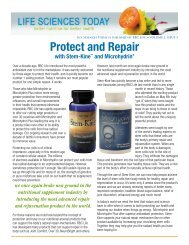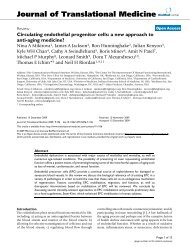Supplement Facts - RBC Life
Supplement Facts - RBC Life
Supplement Facts - RBC Life
Create successful ePaper yourself
Turn your PDF publications into a flip-book with our unique Google optimized e-Paper software.
These nutrients are concentrated in the macula of the eyes giving them their yellow color. 101 The retina<br />
itself is composed of 75% lutein. 96 It has been shown experimentally that regular consumption of<br />
lutein supplements can increase the macular pigment density in the eye, which may potentially help<br />
reduce the risk for later development of AMD. 102<br />
Lycopene<br />
The carotene complex found in 24Seven <strong>Life</strong> Essentials also includes lycopene, which is a carotenoid<br />
predominantly found in tomatoes. Lycopene has been researched extensively over the last several<br />
years because it has demonstrated a variety of protective effects. 101<br />
As a major carotenoid in the blood, lycopene can protect against oxidative damage to lipids, proteins,<br />
and DNA. 102, 103 It is a potent antioxidant towards singlet oxygen, which suggests that it may have<br />
stronger antioxidant potential than other carotenoids. 102<br />
Lycopene has been studied for its role in supporting the inhibition of the progression of mutated cells<br />
in the breast, the endometrial tissue, and in the prostate. 103-105 Lycopene has been shown to protect cells<br />
106, 107<br />
from harmful mutations, often more effectively than other carotenoids.<br />
Epidemiological studies have shown that high concentrations of circulating lycopene offer protection for the<br />
cardiovascular system. 108, 109 Lycopene also shows a protective effect towards the eye and macular tissue. 110<br />
Magnesium<br />
Magnesium is an often-overlooked mineral that has profound effects on the body. A deficiency can<br />
cause a myriad of health challenges, while supplementation often has surprisingly positive benefits.<br />
Like several other minerals, magnesium acts as a cofactor for enzymatic reactions. It is particularly<br />
involved in the reactions responsible for energy production. 112<br />
Magnesium is essential for the uptake of both calcium and potassium. It also assists the body in<br />
maintaining the proper pH balance. A deficiency of magnesium interferes with the transmission of<br />
nerve and muscle impulses, often leading to irritability and nervousness. 113<br />
This essential mineral has been shown in older animals to protect the arterial lining from age-related<br />
changes to the vascular wall (lining of blood vessels), and it is necessary to prevent calcification of soft<br />
tissue. 113, 114 Magnesium also supports blood flow and the entire cardiovascular system. 115, 116 Research<br />
indicates that it may support the maintenance of healthy cholesterol levels. 113 A recent study indicated<br />
that older adults may not have adequate magnesium in their diets to support a healthy vascular system. 115<br />
Animal studies have shown that magnesium deficiency leads to increased bone fragility, altered bone<br />
architecture and diminished bone density (osteoporosis). 118 <strong>Supplement</strong>ing the diet with magnesium<br />
has been shown to help mild depression, dizziness, muscle weakness and twitching, and premenstrual<br />
syndrome. 113 Magnesium also appears to support the brain’s recovery from injury and provide<br />
protection from neurodegeneration and progressive functional deficits. 119<br />
W H Y S U P P L E M E N T A T I O N I S V I T A L T O Y O U R G O O D H E A L T H 13







